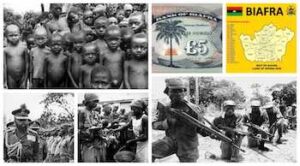
*The Nigerian Civil War, also known as the Biafran War, began on this date in 1967. It was a civil war fought between Nigeria and the Republic of Biafra.
This secessionist state had declared its independence from Nigeria earlier in 1967. General Yakubu Gowon led Nigeria, while Lieutenant Colonel Chukwuemeka Ojukwu led Biafra. The conflict stemmed from political, ethnic, cultural, and religious tensions that had been brewing since the United Kingdom's formal decolonization of Nigeria from 1960 to 1963. Immediate causes of the war in 1966 included a military coup, a counter-coup, and anti-Igbo pogroms in the Northern Region.
The pogroms and the departure of surviving Igbos from the Northern Region to the Igbo homelands in the Eastern Region led the leadership of the Eastern Region (whose population was two-thirds Igbo) to conclude that the Nigerian federal government would not protect them and that they must protect themselves in an independent Biafra. Within a year, Nigerian government troops surrounded Biafra and captured coastal oil facilities and the cities—a blockade led to the mass starvation of Biafran civilians. During the 2+1⁄2 years of the war, there were about 100,000 overall military casualties, while between 500,000 and 2 million Biafran civilians died of starvation.
Besides the concurrent Vietnam War, the Nigerian Civil War was one of the first wars in human history to be televised to a global audience. In mid-1968, images of malnourished and starving Biafran children saturated the mass media of Western countries. The plight of the starving Biafrans became a symbol in foreign countries, enabling a significant rise in the funding and prominence of international non-governmental organizations (NGOs). During the Biafran airlift, Biafra received international humanitarian aid from civilians, an event that inspired the formation of Médecins Sans Frontières (Doctors Without Borders) following the war's end. The United Kingdom and the Soviet Union were the primary supporters of the Nigerian government, while France, Israel (after 1968), and several other countries backed Biafra. The United States' official position was neutrality, considering Nigeria "a responsibility of Britain."
The fighting ended on January 15, 1970; the war highlighted challenges within Pan-Africanism during the early stages of African independence from colonial rule, suggesting that the diverse nature of African peoples may present obstacles to achieving common unity. Additionally, it shed light on initial shortcomings within the Organization of African Unity. The war also resulted in the political marginalization of the Igbo people, as Nigeria has not had another Igbo president since the end of the war, leading some Igbo people to believe they were being unfairly punished for the war. Igbo nationalism has emerged since the end of the war, as well as various neo-Biafran secessionist groups such as the Indigenous People of Biafra and the Movement for the Actualization of the Sovereign State of Biafra.